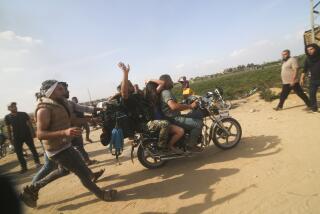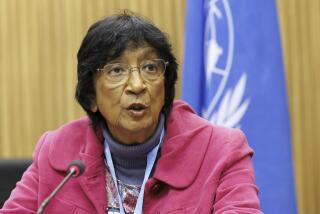Rights Abuses on Both Sides Cited by U.S.
- Share via
WASHINGTON — Finding human rights abuses in countries on both sides of the Persian Gulf conflict, the State Department on Friday accused Iraq of systematic repression of its own people and reported significant violations by the allied governments of Egypt, Saudi Arabia and Syria.
The department’s annual report on human rights conditions throughout the world also contained harshly worded criticism of China, which it accused of engaging in continued repression last year, “if less overtly so than in 1989,” the year of the Tian An Men Square massacre.
The bright spot was Eastern Europe, where democratic reforms begun in 1989 generally were found to have continued despite “major problems encountered by the countries making difficult transitions from command to market economies and from totalitarian communism to democracy,” the report said.
“Totalitarianism and dictatorships are on the decline worldwide, and democracy and respect for the rights of the individual by governments are on the rise,” Richard Schifter, assistant secretary of state for human rights, said at a press conference.
“We have not only seen the consolidation of democracy in Eastern Europe, but 1990 has also seen progress in such widely differing countries as Benin, Cape Verde, Chile, Nepal, Nicaragua, Mongolia, and Sao Tome and Principe,” he said. “Apartheid is on the wane . . . and there is a great deal of democratic ferment in sub-Saharan Africa.”
The massive report, covering human rights conditions in every nation in the world, makes no attempt to rank countries. Even so, the department did not stint in its condemnation of Iraq and its Aug. 2 invasion of Kuwait.
“Iraq’s abysmal record of repression of human rights was even more flagrant in 1990,” the report said. “Almost every category of human rights dealt with in this report is severely restricted or non-existent in Iraq.”
The department said that safeguards such as open trials, representation by counsel and the right to appeal were available to Iraqis charged with common crimes. But it said that torture, summary execution and other abuses were common in political cases.
“Execution has been an established Iraqi method for dealing with perceived political and military opponents of the government,” the report said. “ . . . In some cases, a family only learns that one of its members has been executed when the security services return the body, often showing clear signs of torture, and require the family to pay a fine.”
At the same time, the report did not attempt to spare Washington’s three key Arab allies in the Persian Gulf conflict.
In Saudi Arabia, the report said, “there were no significant developments in human rights in 1990; significant restrictions remained on the freedoms of speech and press, peaceful assembly and association, religion, the right of citizens to change their government, women’s rights and worker’s rights.”
Regarding Syria, the report said: “Human rights remained tightly restricted in virtually all categories, and there was no significant improvement in 1990. . . . Major human rights abuses--including torture, arbitrary arrest and detention, and denial of freedom of speech, press, association and the right of citizens to change their government--continued to characterize the regime’s record.”
In Egypt, the department said, “the pattern of human rights abuses evidenced in 1989 was essentially undiminished in 1990; many basic rights remained significantly restricted. The primary problems continued to be torture of detainees and the government’s failure generally to investigate, try and punish perpetrators of such abuses.”
More to Read
Sign up for Essential California
The most important California stories and recommendations in your inbox every morning.
You may occasionally receive promotional content from the Los Angeles Times.










